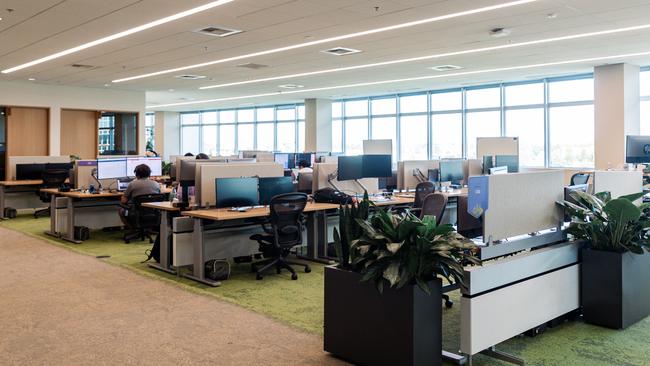Is working from home stopping Aussies from getting pay rises?
There’s a common habit that Aussie workers have picked up in 2023 – and it could be costing them big time.
Careers
Don't miss out on the headlines from Careers. Followed categories will be added to My News.
Is working from home coming at the expense of your career and potential wage growth? It is a question that is beginning to plague Aussies.
Working from home became normalised due to the pandemic and it is a trend that has continued to be extremely popular – but flexibility might be coming at a cost.
On the surface, most Aussie businesses are promoting flexibility, but if you’re someone who chooses to stay at home rather than slog it into the office, is it a bad career decision?
It is a hard thing to measure because bosses aren’t going to say anything that conflicts with company policy.
Still, some Aussies are beginning to notice a trend of people who come to the office being rewarded more than those who don’t.

NSW local *Amy is in her mid-thirties, and she feels she’s treated worse at work because she takes full advantage of its working-from-home policy.
The young worker is beyond frustrated because during the height of the pandemic, she was promised working from home would be the new normal, so she moved out of Sydney to live a more affordable and family-friendly lifestyle. But now she’s paying for that choice.
Amy explained that she feels like the people that still come into the office do it as a move to suck up to senior management and if you stay home and focus on the work, you end up being seen as stand-offish.
“It has been brought up in my yearly one-on-one reviews that I don’t seem like a team player because I’m not in the office enough,” she explained to news.com.au.
Amy received this feedback even though the company policy on paper provided complete flexibility.
Still, she’s come to the difficult realisation that her salary will stay the same if she continues to work from home.
Amy’s work uses a number system to monitor performance. So if you get graded at one, that means you aren’t meeting requirements, if you get graded at three, you are meeting the bare minimum but are not considered a high performer and if you get graded five, you’re exceeding expectations.
“I was getting threes, and I was told if I wanted to get four or five, I needed to be in the office more,” she said.

Amy was also advised that, in order to boost her performance, she needed to focus on chatting more in the office.
“I was told to make myself known on floor walks by talking to people,” she said.
The remote worker finds the emphasis on coming to the office beyond frustrating because she doesn’t think turning up in person is a sign of hard work.
“They go on long lunches, multiple coffee break and most are online shopping at their desks,” she pointed out.
Amy said old-school thinking has left her frustrated and annoyed with her bosses, who she feels are failing to see the bigger picture.
“Punishing someone’s career for seeking a fair work-life balance doesn’t make us respect or seek loyalty from our employers,” she said.


Amy pointed out that the people making these decisions are Boomer bosses who are “privileged” and people who purchased inner city homes when they were still affordable, so they aren’t facing a considerable commute.
“They had to do these long hours at their desk, so they think it is the only way to climb the ladder and expect this from the next generation, but it is time for a change,” she said.
The employee said that she thinks her boss fails to understand why someone would want to have more distance from work because he can’t relate.
“His work is all he has going for him, it’s identity,” she said.
For Amy, her only hope is that, in a decade, all these Boomer bosses obsessed with people turning up to the office will retire and things will start to change.
*Rachel finds herself in a similar position. She works full-time from home in Sydney and finds she’s constantly overlooked.
“Those who work in the office are presented with better opportunities, especially when it comes to having connections with higher ups, training, and being heard,” she told news.com.au.
Rachel said she constantly feels she’s “forgotten” about when it comes to work and, although she doesn’t think her salary has been capped because she chooses to work from home full-time, she does feel that if she wasn’t vocal no one would remember her.
“My yearly reviews where this is discussed are always forgotten about, although the ones done with the staff in the office are always scheduled in advance,” she said.
*Kate works in a corporate job and said she’s constantly amazed that people get rewarded for going into the office.
At her work the official policy is that employees are expected to go in just one day a week, but she says its clear those that go in more often are treated better.
“It is ridiculous how those who go in are rewarded. Just in general – like shout outs in branch meetings, given priority projects, more likely to be chosen for higher duties,” she told news.com.au.
Kate finds this kind of praise “stupid”, especially because the office isn’t even set-up to provide desks for all workers on a full-time basis.
“It has never been a working option and still can’t be. As physically there isn’t enough chairs and tables in our office to cater retuning more,” she explained.


CEO of Workspaces, Brett McAllen, believes that coming into the office does help your career.
“The water cooler effect is alive and well across most workspaces. Whether you bump into others in the kitchen or catch up for coffee during a break, this is where most of the conversations around what is happening in the office occur, i.e., new job openings,” he said.
Mr McAllen said that this is still the way core relationships are built and isn’t something possible to achieve when working from home.
He explained that he thinks working in the office involves a level of “immersion” you can’t achieve from your living room.
“When the office gets super busy due to big projects or nearing deadlines, the energy, buzz and excitement is palpable. People share ideas, throw around thoughts, bounce ideas off the cuff,” he said.
“The workplace becomes a place of innovation and spontaneity. This is difficult to achieve when working from home.”
Instead, Mr McAllen believes that if you want to get to the guts of what is happening, you need to come in.
“When you are working in the office, you are working in the heart of what is happening; you are immersed in and part of the activity. You are present for key workplace moments. The perception is that if you are in the workplace, you are more in touch with and in tune with the organisation.”
*Names have been changed to protect privacy.
Originally published as Is working from home stopping Aussies from getting pay rises?





